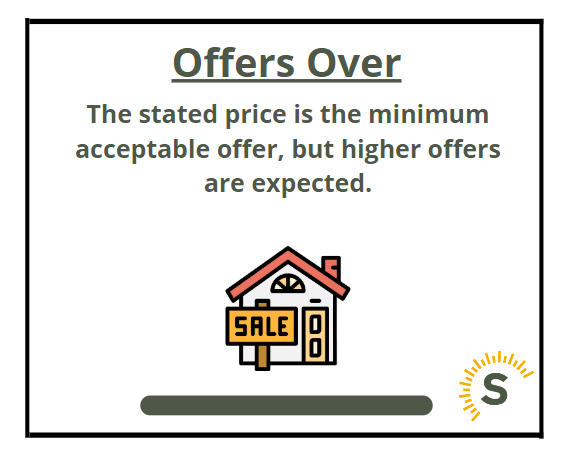
Navigating the property market, whether buying or selling, often feels like decoding a cryptic language. The term 'Offer Over', is a prime example of property jargon that can baffle first-time buyers or sellers. However, the phrase carries essential implications for both parties.
In this insight, we demystify the offer over meaning, offering a comprehensive understanding of its usage, implications and how to make an offer on a property using 'Offers over'.
Offers Over is a pricing strategy adopted by sellers or estate agents while marketing a property to encourage higher offers. It suggests the stated price is the minimum acceptable offer, but higher offers are expected.
However, this does not restrict potential buyers from submitting bids higher than the stated price, potentially leading to a profitable outcome for the seller.

The decision to use an Offers Over price tag for a property can be influenced by different reasons.
Estate agents often employ this tactic as a strategic move. They list the property with a lower price but add the Offers over tag, hoping to attract more potential buyers. This increased interest could lead to higher competition amongst buyers, which might push the offers closer to the seller's desired price.
Sometimes, a property may be unique or located in an area with highly diverse property values. For instance, homes with special features or renovations that make them stand out can be hard to price accurately. In such cases, using the 'Offer over' label allows a range of bids, helping to gauge the market's valuation of these distinct properties.
The Offers Over term is also used when a property is being sold through an auction or open-house event. The property is priced competitively, often lower than its actual value, to generate a bidding frenzy. This approach has the potential to drive the final price higher than the initial asking price.
Regardless of the reason behind it, the Offers Over pricing strategy can benefit both buyers and sellers. For the seller, it clearly communicates the minimum acceptable price, and for the buyer, it provides a clear starting point for negotiations.
While bids below the 'Offers Over' price are likely to be dismissed, there is no hard and fast rule prohibiting such offers. If the property has been on the market for an extended period, or if the offers over price is significantly above the average price of similar local properties, buyers may consider making a lower offer.
Interestingly, industry experts suggest that approximately 85% of homes sell for less than their asking price. Therefore, buyers should not hesitate to submit an offer that they believe accurately reflects the property's value. However, such offers should ideally be accompanied by convincing reasons that highlight the benefits of accepting the lower bid. For instance, demonstrating that you have a mortgage agreement in principle and can proceed with the purchase immediately might give your offer an edge, despite it being lower than the desired price.
When you see an 'Offers Over' price for a property, it gives you an idea of the minimum price the seller is willing to accept. But there's no fixed rule saying how much you should offer on this type of property. Your offer should be based on how much you think the property is worth to you.
No matter how much you offer, the seller has to consider it. They can look at all the offers they receive and then decide what to do next. This way, everyone gets a fair chance, and the seller can choose the best offer for them.
When a property is marketed with the Offers Over price strategy, it can have different results. Some experts warn that it might make the property too expensive, so fewer people would be interested in buying it.
On the other hand, some experts believe it could attract more buyers because of the lower initial price. The competition amongst these buyers might then drive the offers higher than what the seller originally expected. So, it could end up being a profitable strategy for the seller.
While 'Offers Over' is one of the common pricing terms used in property listings, there are several other phrases that buyers and sellers should familiarise themselves with.
'Price on Application', or 'POA', is typically used for high-end, exclusive properties. Rather than listing a specific price, interested buyers must contact the estate agent to ask about the price.
'Offers Invited' is another term often seen in property listings. This phrase is usually used when the estate agent finds it challenging to assign a definitive price to a property. Consequently, potential buyers are invited to submit their offers, giving the estate agent insight into the property's perceived market value.
Read More Other Terms:
Both of these terms have the same meaning. They are used interchangeably when listing property to encourage bidder to offer a higher price. They are normally dictated by the seller who is looking for the right price above a certain level.
.png)
**** 4.2

When you see a property with "Offer Over", deciding what to offer can be a bit tricky. If the price seems reasonable and fits your budget, offering that amount or a little more gives you a better chance of getting the property, especially if there's competition.
However, if the price looks too high or the property isn't selling well, it's okay to offer less. Just be sure to explain why you're offering less, like mentioning any needed repairs or local market trends.
Understanding the offers over meaning, and how it works can make navigating the property market easier. Whether you're buying or selling, it can help you make smart decisions that match your financial goals.

Stuart is an expert in Property, Money, Banking & Finance, having worked in retail and investment banking for 10+ years before founding Sunny Avenue. Stuart has spent his career studying finance. He holds qualifications in financial studies, mortgage advice & practice, banking operations, dealing & financial markets, derivatives, securities & investments.





Our website offers information about financial products such as investing, savings, equity release, mortgages, and insurance. None of the information on Sunny Avenue constitutes personal advice. Sunny Avenue does not offer any of these services directly and we only act as a directory service to connect you to the experts. If you require further information to proceed you will need to request advice, for example from the financial advisers listed. If you decide to invest, read the important investment notes provided first, decide how to proceed on your own basis, and remember that investments can go up and down in value, so you could get back less than you put in.
Think carefully before securing debts against your home. A mortgage is a loan secured on your home, which you could lose if you do not keep up your mortgage payments. Check that any mortgage will meet your needs if you want to move or sell your home or you want your family to inherit it. If you are in any doubt, seek independent advice.